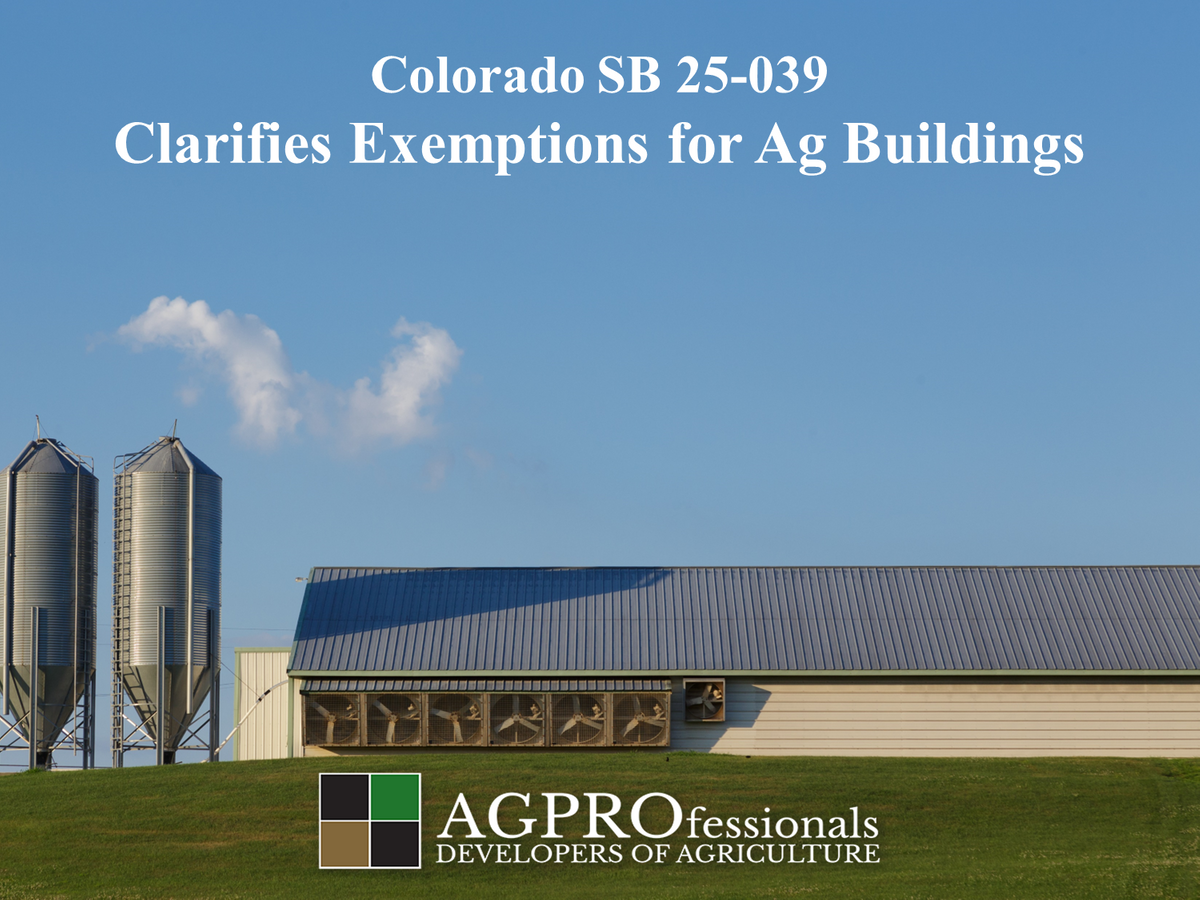AGPROfessionals Exposed Problems with Colorado HB 21-1286, and Now We Have a Proposed Bill
Since the establishment of HB 21-1286, the Colorado Energy Office (CEO) has not adhered to the agricultural exemption. Shortly after the passage of HB 21-1286, some of our clients — farmers with free-stall barns and other local producers — began receiving notices from the State Energy Board regarding the status of their buildings. These notices required them to navigate complicated processes and pay fees to prove that their agricultural buildings were exempt. Upon discovering this issue, we decided to take action. Our first step was to publish an article titled “Colorado Energy Office Shakedown is a Hidden Tax.”
Next, we worked with Senator Byron Pelton to ensure that it was crystal clear to the Colorado Energy Office that the buildings owned by our agricultural clients and other producers in the state are, in fact, exempt.
An Exemption That Wasn’t an Exemption
In 2021 the Energy Performance for Buildings Statute (Colorado House Bill 21-1286), was passed to help building owners lower energy costs, increase energy efficiency, and decrease greenhouse gas emissions. The bill requires all buildings over 50,000 square feet to comply with the new regulations by 2030, with the exemption of agricultural buildings.
While the verbiage in HB 21-1286 is clear on what “covered buildings” are included in the statute. The following is stated in the text of HB 21-1286:
(II) "COVERED BUILDINGS” DOES NOT INCLUDE:
(B) A BUILDING IN WHICH MORE THAN HALF OF THE GROSS FLOOR AREA IS USED FOR MANUFACTURING, INDUSTRIAL, OR AGRICULTURAL PURPOSES
However, despite the fact that the language shows that agricultural buildings were exempt, the Colorado State Energy Board disregarded exemption statuses and sent notices to agricultural producers stating:
- Unfortunately, the documentation you have provided is insufficient…
- …If you do not provide the proper documentation as described above within 2 weeks, your exemption will be denied.
They provided two options for agricultural producers with buildings over 50,000 square feet:
1) Submit a benchmarking report and pay an annual fee of $100 per covered building.
2) Submit a waiver and pay an annual fee of $100 per covered building.
If a farmer must pay a $100.00 permit fee every year, is agriculture truly exempt, or is it a hidden tax? These two options definitely fell far outside the definition of “exempt.”
Even though agricultural buildings are exempt, and after opting to be cooperative and jumping through hoops, farmers are still receiving notices that state:
- Unfortunately, the documentation you have provided is insufficient. Please see below for the required documentation you are to provide in order to re-evaluate your exemption application.
- Our program director is looking to receive the full floor plans for these buildings. Similarly, storage also does not count towards the 50% or more of your gross floor area being used for Agricultural, Industrial, or Manufacturing processes.
- Please include the proper documentation in your reply to this email. If you do not provide the requested documentation as described above within 2 weeks, your exemption will be denied.
Funding the Program Through Fees, Fines, and Grants
As we stated in our previous article about HB 21-1286, the program is to be funded through fees, fines, and grants. It states first offense fees to be $500.00 and then jumps to $2,000.00 for each subsequent offense. See where this is going? The department must collect fees and fines to keep its doors open.
Thank You, Senator Byron Pelton – Making the Exemption Clear
Thankfully, Colorado Senator Byron Pelton has stepped up and proposed a new bill; to make it clear all agriculture buildings will be exempt from HB 21-1286 regulations. The draft of Sen. B Pelton’s proposed bill makes the exemption of agricultural buildings from compliance with HB 210-1286 exceedingly clear. If Sen. B Pelton’s proposed bill is passed, Colorado farmers will be able to once again own agricultural structures without the worry of paying fees to the State Energy Board and being subject to fines on their supposedly exempt buildings.
The proposed bill states:
(b.5) “AGRICULTURAL BUILDING” MEANS A BUILDING OR STRUCTURE USED TO HOUSE AGRICULTURAL IMPLEMENTS, HAY, UNPROCESSED GRAIN, POULTRY, LIVESTOCK, OR OTHER AGRICULTURAL PRODUCTS OR INPUTS.
The draft goes on to further clarify what buildings should not fall into the “covered buildings” category.
(j) (II) Covered building does not include:
(B) A building in which more than half of the gross floor area is used for MANUFACTURING OR INDUSTRIAL PURPOSES;
(C) A single-family home, duplex, or triplex; OR
(D) AN AGRICULTURAL BUILDING
Pushing the Bill Forward – Colorado SB 039
Passage of the bill is imperative for Colorado farmers and ranchers. Without it passing, many will continue to face unnecessary hoops, a hidden tax, and impending fines from the State Energy Board on agricultural structures, which should be exempt according to HB 21-1286.
The new bill under consideration is Colorado SB 25-039, and the prime sponsors are Senators Byron Pelton and Jeff Bridges and Representatives Matthew Martinez and Dusty Johnson.
To stay current on Sen. B Pelton’s proposed exemption bill, follow trusted sources on the subject, such as AGPROfessionals, Sen. B Pelton’s legislative page, and the Colorado Accountability Project. To further support the bill, contact Sen. B. Pelton.
Links
Colorado General Assembly Link to SB 25-039 HERE
Fiscal Note for Colorado SB 25-039 HERE
Colorado Accountability Project on HB 21-1286 HERE
AGPROfessionals on HB 21-1286 Agricultural Exemptions HERE
Colorado HB 21-1286 HERE

